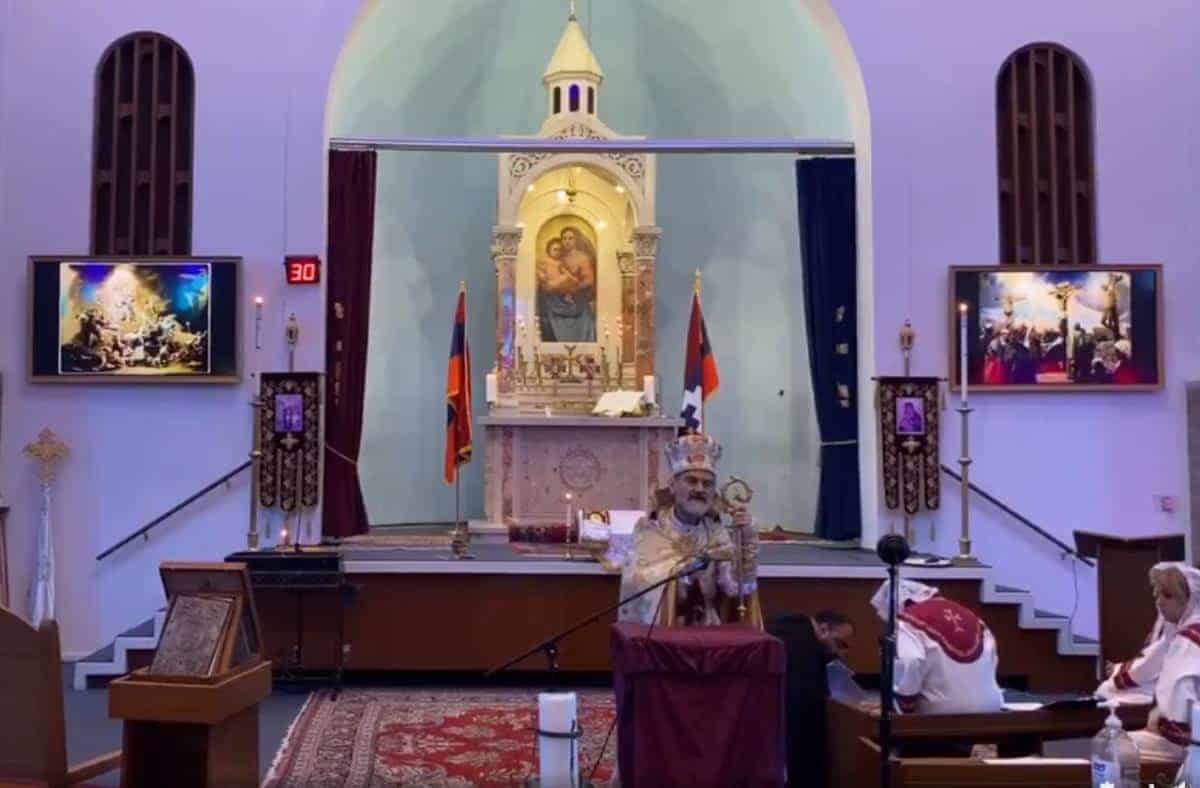Today, on the seventh Sunday of the Feast of the Holy Cross, according to the Armenian Church calendar, we are celebrating the Feast of the Discovery of the Holy Cross. This is the crowning of the celebrations of the Cross, within the cycle of an entire calendar year. The Apostolic Churches owe this important feast, upon which the other celebrations of the Cross throughout the year are established, to Queen Helena, the mother of Emperor Constantine. In 327, the Queen, who was in her mid-seventies, set out on a long journey to Jerusalem with the primary intention of finding the actual Cross upon which Jesus Christ had been crucified. Following a series of inquiries, with the help of a local person named Jude, the Cross was discovered, and the authenticity of the relic was tested by a miracle.
When the Cross was unearthed, two other crosses were found in the same place. As we know, Jesus was crucified with two thieves, and when the three crosses were discovered side by side, it raised questions about which was the True Cross. Just then, a funeral procession was passing by. The procession was stopped, and the corpse of the deceased was placed upon the first cross. Nothing happened. The corpse was then placed upon the second cross. Again, nothing happened. Finally, the corpse was placed upon the third cross which happened to be the True Cross. Immediately, the deceased came back to life having touched the very wood upon which Jesus had been crucified.
As much as this is a historical event, yet it energizes our faith today, and so I would like to share the following points:
a. Big dreams, when followed by solid actions, on a short or long term, are accomplished. Just as we have seen during the feasts of the Elevation of the Cross and of Varak Cross, the Discovery of the Cross is the result of setting a priority and of devoted commitment. In her luxurious life, to assume such an obligation to find the Cross, the Queen Mother provides us with a wonderful example that, far more than material acquisition, our soul is in search of higher matters, which pertain to things heavenly and divine.
b. Queen Helena, by planning and actualizing such a plan in her late age, gives us the most positive pulse and energy, that with all its physiological disadvantages, age is not the only decisive factor to realize our dreams. To undertake such a tiresome trip when someone is past the age of seventy indeed makes both young and aged people to think about the power of our soul, which transcends the limitedness of the flesh, and enables us to achieve noble acts for the benefit of the community at large.
c. The pilgrimage of the Queen Mother was motivated by her Faith and was energized by Hope. Under the terrifying circumstances of the persecutions up to that time, it was quite understandable that the believers would not dare to make the least attempt to retrieve this precious relic. However, the passionate engagement of Queen Helena is indeed phenomenal. What were the chances of finding a piece of abandoned and ignored wood, which might have already been destroyed or at least significantly decayed over the previous three centuries? Hope is indeed the power of acting against all odds. And literally, history once again witnessed the mysterious intervention of Providential Care by justifying the blessings of Queen Helena’s hope.
d. As much as the Cross is a piece of wood, we, the believers of the Apostolic Churches, revere it. Any criticism identifying this reverence toward the Cross with the worship of idols is baseless. If the woman who had suffered from a discharge of blood for twelve years and by touching the fringe of Jesus’ garment was healed and was praised for her faith (Mt 9:20), who can rebuke us for our reverence toward the Altar upon which the Divine sacred Blood was shed for our salvation? We do revere the Cross by worshipping the Crucified One.
e. The miracle of raising a dead person by laying him upon the Cross is evidence that God’s almighty power can be revealed at any time and through all means. As believers, it is our obligation to trust Him, who is the Ultimate Lord. Our faith, our biblical knowledge can never be used as a remote-control mechanism in a feeble attempt to direct God and to cast Him in a frame within our limited knowledge and expectations. If “God can raise from the stones children for Abraham” as Jesus said (Mt 3:9) who are we to challenge the ways and the means of revelation of His power?
Therefore, with this simple yet conscious and deep faith, let us always thank the Lord who for our sake submitted Himself to the worst and shameful punishment on a piece of wood, transforming the instrument of death into the life-giving Tree. Let us always praise so that through visible and invisible things we can have access to His Glory. Amen.

